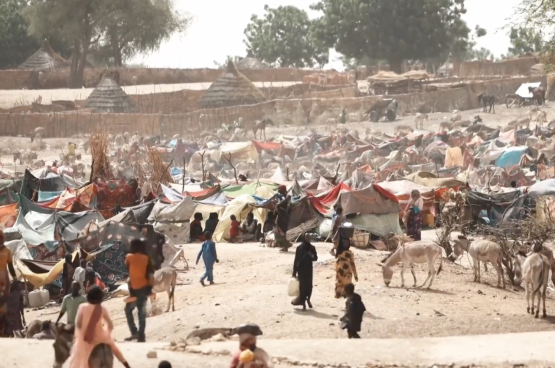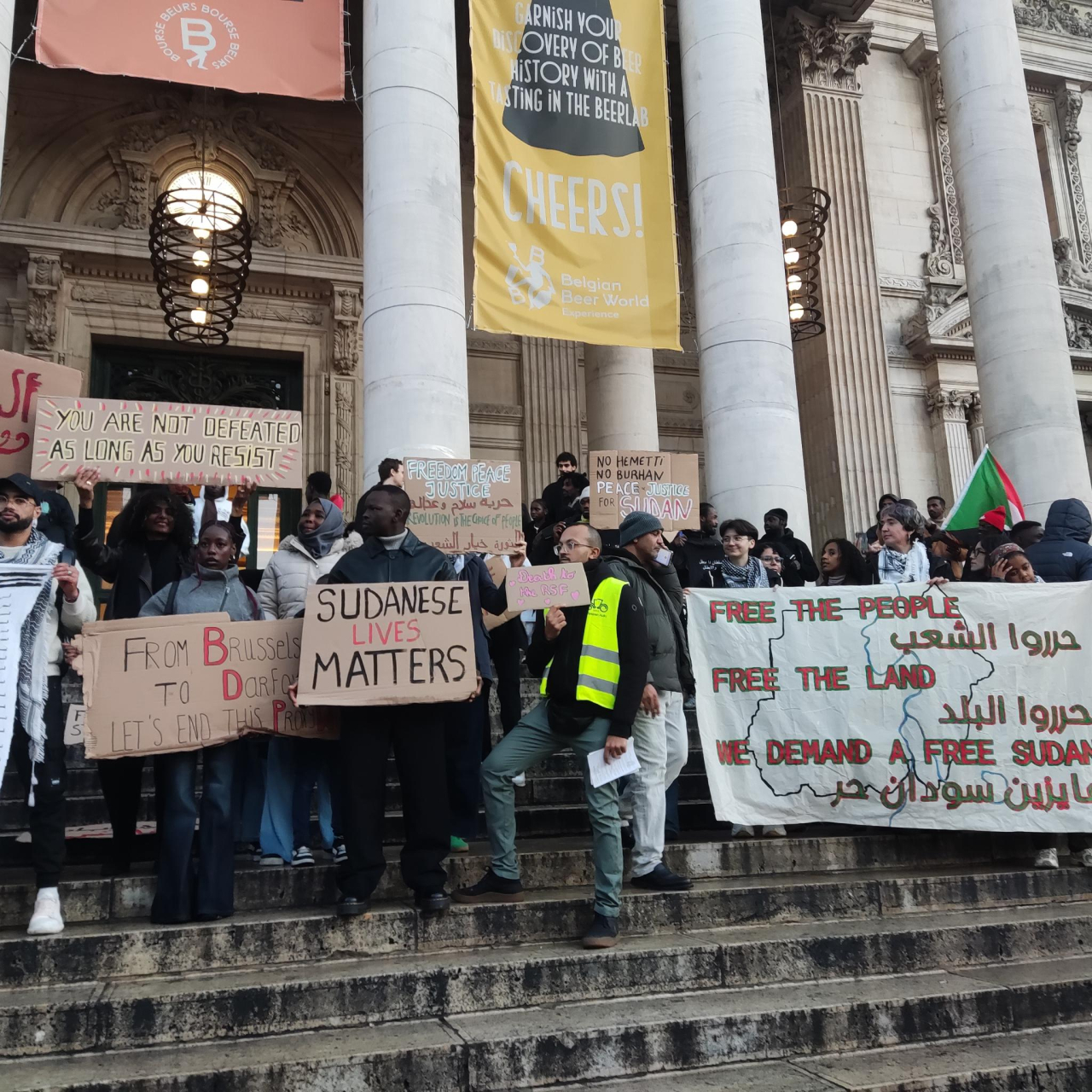Sudan: How Imperialism Fuels War and Mass Violence
The civil war today tearing apart Sudan is not just a conflict between rival generals. Rather, it is the direct and tragic consequence of the plundering of the resources under the country’s soil, for the benefit of foreign powers. Only an end to outside interference, and the mobilisation of the Sudanese people to force the creation of a civilian government without military involvement, can put an end to the horror.
According to the United Nations Refugee Agency (UNHCR), this conflict has already displaced 13 million people: 8.6 million internally displaced persons and more than 4 million who have become refugees abroad. Nearly 150,000 people have lost their lives. The Rapid Support Forces (RSF) have committed appalling atrocities, particularly in El Fasher, which is now in the hands of paramilitaries following an eighteen-month siege. The fall of this strategic city, which had offered shelter to 260,000 refugees, was accompanied by rampant famine and numerous atrocities. These included summary executions, sexual violence, attacks on fleeing civilians and executions of unarmed men, as recently confirmed by the UN Human Rights Commission.

A Long History of Exploitation
For decades, the appetites of imperialism have seriously destabilised Sudanese society. The country, of great strategic importance due to its long coast along the Red Sea, its overall size (giving it seven borders with other African countries), and its mineral wealth (uranium and gold mines, Nile resources), has been constantly targeted.
While the period from 1993 to 2020 saw Sudan appear on Washington’s list of state sponsors of terrorism, this classification also served as leverage to put pressure on the Sudanese state in the context of civil war. This ultimately led to the secession of South Sudan in 2010.
The Betrayed Revolution of 2019
In April 2019, a massive popular uprising overthrew dictator Omar al-Bashir. This revolt was led by revolutionary neighbourhood committees and civilian forces, supported by a network of medical doctors and lawyers.
However, Bashir’s regime was supported by a military elite that itself benefited from the plundering of national wealth by Saudi Arabia, the United Arab Emirates and Egypt, with these powers using illegal channels to smuggle gold and other resources from the country.
After Bashir’s downfall, the West supported a transitional government. The Forces of Freedom and Change (FFC) agreed to form a new administration in August 2019 with military involvement. The popular movement, despite its strength, found itself marginalised: real power remained in the hands of the army, which controlled the economy and public finances. The Sudanese Communist Party was a founding member of the FFC, but refused to participate in the government as long as the military was involved.
In 2020, Donald Trump made Sudan’s removal from the list of state sponsors of terrorism conditional on General Burhan paying $335 million to victims of terrorism, thereby guaranteeing US and Israeli support for the military leadership.
The transition was definitively sabotaged in October 2021, when the military concentrated all power in a coup orchestrated by Abdel Fattah al-Burhan, head of the army, ousting civilian Prime Minister Abdallah Hamdok. This coup “tore up the Transitional Constitutional Charter, plunging the nation into a prolonged and catastrophic war”.
Proxy War
In April 2023, war broke out between two armies: the regular army led by Burhan, who is president of the transitional council, and the Rapid Support Forces (RSF) commanded by Mohamed Hamdan Daglo (Hemedti), who is vice-president of the same transitional council. Both armies are products of Bashir’s dictatorship: the RSF are the former Janjaweed — the militias that wreaked havoc in Darfur — who Bashir and Burhan transformed into a paramilitary force in 2013.
Today, the war is no longer a simple local affair, but a proxy war between different foreign powers. All of them covet Sudan’s riches. The country has become the battleground for two petro-monarchies, with the United Arab Emirates (UAE) supporting the RSF and Saudi Arabia allied with the regular army. Sudan’s gold industry is the driving force behind this conflict, with almost all trade passing through the UAE before it enriches the belligerents.
The “Quad” (the United States, Saudi Arabia, Egypt, and the USA) has started negotiations for an agreement. But “any agreement negotiated under these conditions will only reproduce the crisis, as history has repeatedly shown in Sudan and elsewhere”, the Sudanese Communist Party insists. Current attempts to reach an agreement threaten to divide the country once again between the army and the RSF.
Escalating Foreign Interference
The United States and Israel are seeking to control the north of the country by way of the army leadership. For Israel, this region is even considered as a possible location for the forced resettlement of Palestinians. The Sudanese Communist Party warns against this logic, deeming this “part of the ‘Greater Middle East’ project, whose strategic logic aims to dismantle national units in the region in order to facilitate imperial expropriation”. This has taken the form of “the systematic liquidation of the Palestinian cause, the genocide and forced displacement of the Palestinian people, [and] the attempt to erase the Sudanese revolution.”
The United Nations’ Secretary-General António Guterres has called for an end to foreign military support, stressing that “the problem lies not only in the fighting … but also in growing external interference.”
European Weapons
Amnesty International has revealed that the warring parties are receiving French-made weapons mounted on UAE armoured vehicles used by the RSF, which is a “clear violation of the UN arms embargo” on Darfur.
Amnesty International Secretary General Agnès Callamard is categorical, in this regard: “All countries must immediately stop supplying any weapons and ammunition, whether directly or indirectly, to the parties to the conflict in Sudan,” and they “must respect and enforce the arms embargo on Darfur … so that more civilians do not lose their lives.” British-made weapons have also been supplied by the United Arab Emirates to the RSF, despite rules that require a halt to exports if there is a clear risk of weapons being rerouted toward embargoed areas or being used to commit atrocities.
Mobilising the Population
Faced with this orchestrated dismemberment of the country, the Sudanese civil resistance is calling for popular mobilisation to stop the war.
For the Sudanese Communist Party, “what is needed now is to build the broadest possible popular national front, uncompromising in its demand for an immediate cessation of hostilities, a revival of the revolutionary dynamic and the preservation of Sudan’s unity”. The overthrow of the two illegitimate regimes is imperative, and it requires the complete withdrawal of the military establishment, the RSF, and all militias.
There must be an end to foreign interference, and an end to any support for an agreement that maintains the military’s grip on the country. Both armies must return to their barracks and the war crimes committed by both sides must be brought before the justice system. The popular movement rightly demands that the unity and sovereignty of the country must be preserved and that power must be returned, in full, to a civilian government.
The stakes extend far beyond Sudan’s borders alone: as the Sudanese Communist Party points out, the logic of imperialist dismemberment of the country threatens “not only peace, but the sovereignty of Sudan and the future of the African continent”.
| Collectif Solidarité Soudan Belgique On Saturday 1 November, the Collectif Solidarité Soudan Belgique organised an action at the Stock Exchange in Brussels, Belgium. The collective denounced a reality in which: “The counter-revolutionary war in Sudan has been going on for more than two and a half years, during which time more than 12 million people have been displaced, while the international community remains silent and complicit, or else settles for issuing empty statements of support.” The collective denounces the United Arab Emirates for supplying weapons to the Rapid Support Forces and financing terror against the Sudanese people. The UAE is plundering Sudan’s gold and wants to take possession of its arable land. The collective also denounces the complicity of the European Union and Belgium, which are rewarding the UAE by negotiating free-trade agreements with it. Belgian companies such as Jan De Nul, DEME and BTP BESIX are involved in the construction of major infrastructure projects while their partners finance terror in Darfur and supply weapons which are often produced by the European armaments industry. |
Originally published in French by Solidaire, digital daily of the Worker's Party of Belgium.
English translation for transform! europe by David Broder.
